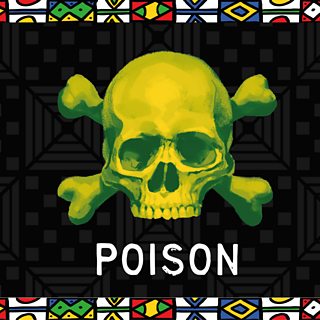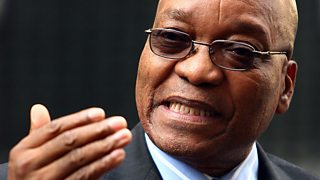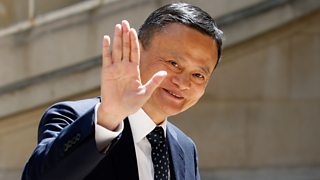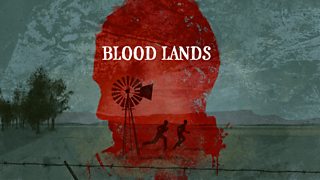Poison – the mystery of South Africa’s toxic new political conspiracy
Andrew Harding reports from Johannesburg.
Who is poisoning South Africa’s politicians?
In a country seemingly overwhelmed by corruption, and scarred by vicious factional battles within the governing party, a strange new conspiracy has emerged, involving claims that prominent figures within the African National Congress party have been targeted for murder by assassins using poison.
“I was given poison,” declared a former State Security Minister, Bongani Bongo recently.
“I thought it was just an allergy… but it was confirmed that it was poison,” said an aide to the ANC’s Secretary General, Ace Magashule.
Even South Africa’s current deputy President, DD Mabuza, has pointedly failed to deny public claims that he, too, has been targeted, and nearly died, after being given poison.
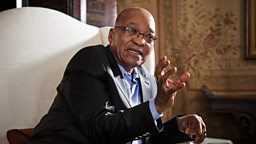
Are these claims proof of a sinister new technique being used to settle scores?
South Africa is a country which already has a long and brutal history of political murders that stretches back into the apartheid era, when there were confirmed incidents of the former white minority government using poison to target prominent leaders of the liberation struggle. In one notorious case an activist nearly died after several pairs of his underpants were laced with poison.
In one notorious case a South African activist nearly died after several pairs of his underpants were laced with poison.
Or is this more likely to be a baseless conspiracy theory designed to enhance the reputation of certain politicians by enabling them to boast that they’re worthy targets of local or international plots, while giving them an added opportunity to smear their rivals as cowardly assassins?
“There are those among us who are seriously concerned. I’ve refused to drink a cup of tea at Luthuli House (the ANC headquarters in Johannesburg) [for fear of being poisoned]… and I’m not a particularly paranoid person. The African National Congress is a sadly and deeply divided organisation,” said Carl Neihaus, a former spokesman who was recently expelled from the party.
“I don’t think many people believed this poison story. I really don’t think they did. I think it’s just a way of attracting attention and diverting it [from allegations of corruption],” retorted a prominent ANC veteran, Mavuso Msimang.
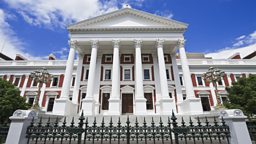
The poison theory appears marked by four characteristics
The first is that no medical evidence of poison has been produced in democratic South Africa. No victim, or alleged victim, has shown the public any positive test results. Nor has any doctor formally backed up a single report of poison. Those claiming to have been poisoned, and survived, tend to hide the truth about their health behind a cloak of medical confidentiality, fuelling claims of a culture of political hypochondria.
Those claiming to have been poisoned, and survived, tend to hide the truth about their health behind a cloak of medical confidentiality, fuelling claims of a culture of political hypochondria.
The second is that many alleged poison victims have travelled to Russia or to Cuba for what they’ve said was medical treatment. Most of them have cited a clinic in Moscow, with alleged ties to the Kremlin and a near miraculous reputation for curing victims of unspecified poisons. But sceptics, like the South African writer and author of a book on poison, Imraan Coovadia, have wondered whether the Russians are “telling these politicians what they want to hear about their diagnosis, in inferring the existence of some mysterious poison,” to gain leverage over South African politics. The ANC had close relations with the Soviet Union during the Cold War era, and those old links – and anti-western sentiment – still exert some influence.
The third characteristic is that many politicians who claim to have survived a poisoning are facing allegations of corruption, which they’ve denied. This plays into the argument that they are using a conspiracy theory to distract attention from their legal troubles and to portray themselves as victims of either local rivals or foreign state actors who want to kill them because of their radical political beliefs.
The fourth, and perhaps key, characteristic, is that most alleged victims have been allies of the man who can reasonably claim to be the founder of South Africa’s democratic-era poisoning conspiracy. Jacob Zuma, the country’s disgraced former President, is currently on medical parole having been jailed for contempt of court. He is now on trial in a separate corruption case.
One man’s toxic obsession
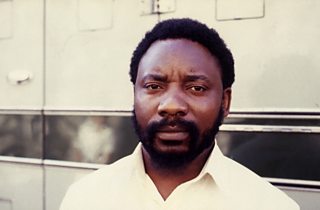
Mr Zuma, a hero of the struggle against racial apartheid, has been warning of various sophisticated plots to poison him for many years, and has flown both to Moscow and Havana for treatment and ordered a special toxicology unit to test his food and bedding.
“It was a very sophisticated poison… Three types [combined]. Very dangerous. I did not believe that I survived, but I did,” said Zuma recently, in reference to one alleged incident for which he sought treatment in Russia, on the invitation of Vladimir Putin.
The poison claims have, increasingly, become linked to a broader conspiracy theory being promoted by Mr Zuma’s faction within the ANC – whereby South Africa’s current President Cyril Ramaphosa is accused of working, treasonously, with white businessmen and western governments and intelligence organisations, to prevent the black majority from achieving economic prosperity and freedom. Mr Zuma claims to have a list of traitors within the ANC, who have worked in secret for years on behalf of the CIA.
For more on a murky story of one man’s obsession – and a wider tale that ranges from the darkest days of South Africa’s liberation struggle to Cold War paranoia, to the high-stakes power battles now raging within the governing ANC – listen to Poison on Â鶹Éç Sounds.
More from Radio 4
-
![]()
Profile: Jacob Zuma
Chris Bowlby profiles ANC leader Jacob Zuma.
-
![]()
Where is Jack Ma?
Chinese billionaire Jack Ma is missing. So where is Jack Ma? Celia Hatton investigates.
-
![]()
Blood Lands
A true story of murder investigation which takes us to the heart of modern South Africa.
-
![]()
How to Cure Viral Misinformation
The story of one misleading post - and how we can all stop the spread of bad information
